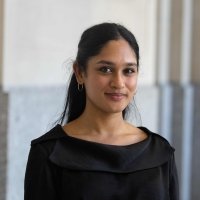Forced Displacement in MENA and Its Gendered Impacts
Submit a question
In the past two decades, conflicts in the Middle East & North Africa have forced millions to flee their homes in Iraq, the Palestinian Territories, Syria, Sudan, Libya, and Yemen. As the world is witnessing another wave of forced displacement with 1.7 million Palestinians displaced due to the war in Gaza, as well as the 9.0 million internally displaced in Sudan in addition to more than 7.0 million displaced inside of Syria and 5 million to neighboring countries and 1.2 million in Iraq, the vulnerability of women and girls to the harms of forced displacement has never been more visible and acute. From lack of access to maternal and reproductive health, basic health and sanitation, and increased gender-based violence, women and girls face tremendous stresses on their physical and psychological well-being and constraints on their livelihoods and their families.
To mark World Refugee Day, the Middle East Program hosted an expert panel to discuss the gendered impacts of forced displacement across the Middle East & North Africa. They addressed patterns of forced displacement; the unique challenges that women and girls face, and how policymakers can better address their needs and generate conditions of safety, security, and prosperity, among other issues.
Keynoter Lindsay Jenkins, Senior Adviser for Migration Policy Bureau of Population, Refugees, and Migration, US Department of State, highlighted that when gender equality is tied to nationality rights and governance it hinders societal recovery—particularly in MENA, which has the highest concentration of gender-discriminatory nationality laws. The US is committed to addressing these issues through initiatives, such as Safe from the Start ReVisioned in Syria and Iraq, the Women’s Participation Project in Yemen, and Empower Aid in Lebanon and Jordan. These programs aim to protect women and girls from gender-based violence, support their participation in refugee camp governance, and prevent child marriage.
Unique challenges for displaced women
Yara Asi, assistant professor, University of Central Florida, discussed the dire situation of Palestinian displacement, starting with the Nakba in 1948. Today, in Gaza, Israeli offensives have destroyed many homes, leaving people without a place to return. Women and children are disproportionately affected, facing famine and a lack of essential services. For pregnant women and nursing mothers, the extreme stress prevents them from producing milk, further complicating care for their children.
Lina Sergie Attar, founder and CEO, Karam Foundation, shared her experiences with Syrian refugee women in southern Hatay, Turkey. She explained how they confront language barriers, limited opportunities, and societal rejection. The 2023 earthquake worsened these hardships, displacing hundreds of thousands more. Many of these households are female-led, and mothers often resort to sending their children to work or marry due to economic desperation.
Reva Dhingra, policy and planning advisor, International Rescue Committee, emphasized how displaced women face economic marginalization, financial exclusion, and mobility restrictions. They experience higher risks of intimate partner violence, with rates as high as 42% in South Sudan. In Lebanon, only 15% of Syrian women have legal residency, and they are at disproportionate risk of gender-based violence (GBV); in 2022, 74% of registered female GBV survivors were Syrian.
Climate change intensifies drivers of displacement
Jenkins stated that the climate crisis exacerbates existing vulnerabilities: women and girls in the region disproportionately experience the impacts of water scarcity, food insecurity, and declining health outcomes.
Dhingra added that climate change acts as a ‘threat multiplier,’ worsening existing inequalities in fragile and conflict-affected countries. Women and girls, particularly those dependent on agriculture, are especially vulnerable. They are traditionally responsible for managing natural resources, such as collecting water and firewood. Now, they are forced to travel longer distances for these tasks, increasing their risk of GBV.
Building sustainable solutions together
Global Fellow Sola Mahfouz discussed the importance of acknowledging that refugees had lives, dreams, and hopes before their displacement. Mahfouz stressed the need to give them space to be heard and recognized, as they lose so much in war. Asi emphasized the importance of addressing the root causes of displacement and providing long-term support for economic empowerment and mental health services.
Attar discussed creating opportunities for self-sustainability and integrating refugees into society, while Dhingra highlighted the need for targeted economic and educational programs, including financial inclusion and vocational training. Further, Jenkins said that collaboration is essential to meet immediate humanitarian needs and help forcibly displaced persons live with hope and dignity.
The panelists also called for localized solutions that involve displaced communities in decision-making and support local NGOs and community organizations that understand their needs and challenges.
Introduction

Keynote Speaker
Moderator

Panelists




Co-Author, Defiant Dreams
Hosted By

Middle East Program
The Wilson Center’s Middle East Program serves as a crucial resource for the policymaking community and beyond, providing analyses and research that helps inform US foreign policymaking, stimulates public debate, and expands knowledge about issues in the wider Middle East and North Africa (MENA) region. Read more


Middle East Women's Initiative
The Middle East Women's Initiative (MEWI) promotes the empowerment of women in the region through an open and inclusive dialogue with women leaders from the Middle East and continuous research. Read more


Maternal Health Initiative
Housed within the Wilson Center's Environmental Change and Security Program, the Maternal Health Initiative (MHI) leads the Wilson Center’s work on maternal health, global health equity, and gender equality. Read more


Refugee and Forced Displacement Initiative
The Refugee and Forced Displacement Initiative (RAFDI) provides evidence-based analyses that translate research findings into practice and policy impact. Established in 2022 as a response to an ever-increasing number of people forcibly displaced from their homes by protracted conflicts and persecution, RAFDI aims to expand the space for new perspectives, constructive dialogue and sustainable solutions to inform policies that will improve the future for the displaced people. Read more
